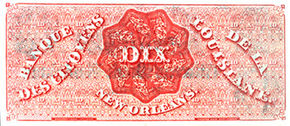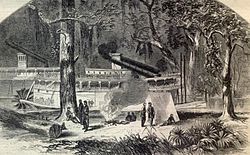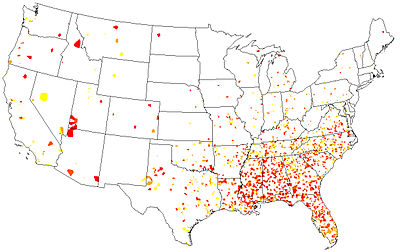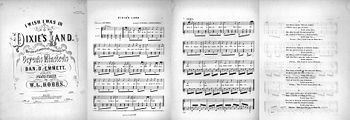- Dixie
-
For other uses, see Dixie (disambiguation).
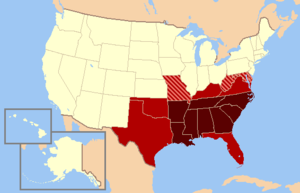 The states in dark red are almost always included in modern day definitions of the Southern United States, while those in medium red are usually included. Those cross-shaded are sometimes included due to their historic connections to the South.[1][2][3]
The states in dark red are almost always included in modern day definitions of the Southern United States, while those in medium red are usually included. Those cross-shaded are sometimes included due to their historic connections to the South.[1][2][3]
Dixie is a nickname for the Southern United States.
Contents
Origin of the name
According to the Oxford English Dictionary, the origins of this nickname remain obscure. According to A Dictionary of Americanisms on Historical Principles (1951), by Mitford M. Mathews, three theories most commonly attempt to explain the term:
- The word "'Dixie'" refers to privately issued currency from banks in Louisiana.[4] These banks issued ten-dollar notes,[5] labeled "Dix", French for "ten", on the reverse side. The notes were known as "Dixies" by English-speaking southerners, and the area around New Orleans and the French-speaking parts of Louisiana came to be known as "Dixieland". Eventually, usage of the term broadened to refer to most of the Southern States.
- The word preserves the name of a "Mr. Dixy", a slave owner on Manhattan Island[citation needed], where slavery was legal until 1827. His rule was so kindly that "Dixy's Land" became famed far and wide as an elysium abounding in material comforts.
- "Dixie" derives from Jeremiah Dixon, a surveyor of the Mason-Dixon line which defined the border between Maryland and Pennsylvania, and, for the most part, free and slave states (a small portion of Delaware, a Union border state, and slave state up to the ratification of the Thirteenth Amendment, lay north of the boundary.)
Dixie as a region
As a definite geographic location within the United States, "Dixie" is usually defined as the 11 Southern states that seceded to form the Confederate States of America. They are (in order of secession): South Carolina, Mississippi, Florida, Alabama, Georgia, Louisiana, Texas, Virginia, Arkansas, North Carolina, and Tennessee. This definition is strongly correlated with history and, in the minds of many Southerners, remains the traditional South.
In other ways however, the "location" and boundaries of Dixie have become, over time, more limited, vernacular, and/or mercurial. In popular mindset today, it is most often associated with those parts of the Southern United States where traditions and legacies of the Antebellum South live most strongly.
In this particular contemporary realm, there are no hard and fast lines. Roughly, however, it might be an area which begins in the Eastern Shore of Maryland (and the southern parts of West Virginia), then extends south into Central Florida. On the northern boundary it sweeps west to take in Tennessee and southern parts of Kentucky, then continues through Arkansas, possibly taking in southern Missouri and also Oklahoma. On the southern end it would run through the Gulf states until the northern and southern boundary lines connect to include East Texas. For a more detailed description and delineation, see The Nine Nations of North America by Joel Garreau.
Many businesses in the South contain "Dixie" in their name as an identifier, e.g. "Dixie Produce". One of the more famous is supermarket chain Winn-Dixie.
Related to this fact, cultural sociologist and "Southernologist" Dr. John Shelton Reed has attempted to "locate" Dixie by a criterion measuring the ratio of business listings containing the term as compared to those utilizing "American". First published in a 1976 article in Social Forces, this particular study was later updated in 1988. In contrasting the two, the delineating lines measuring over 6% of Dixie to American remained fairly constant in covering the Old Confederate States, with the exception being in Texas where, in both surveys, it was fairly well limited to eastern parts of the state.[citation needed]
Noted anomalies were the inclusion, and later even slight extension, into parts of the lower Midwest, particularly southern Indiana and southwestern Ohio. Neither of these areas can be properly considered a part of the South, so one explanation could be the extent of the so-called "Dixie Highway" into those particular locales and business names reflecting such. The red areas in Utah are explained by the locals' choice of the nickname Dixie for the low-lying and thus very warm areas in the southwestern part of the state.[citation needed]
In using a yardstick of 15%, all but a tiny slice of northeast Texas drops out of the picture. Also losing considerable ground were Virginia and most of Florida save the panhandle. Notable losses also occurred in North Carolina and Kentucky. Most remarkable of all however, was, as Reed stated, the fact that Dixie "dissolves as a coherent region" when the even more demanding standard of 25% was applied. In 1988 as compared to 1976, with the exception of small and isolated parts of adjoining states, only in Mississippi, Alabama, Georgia, and South Carolina were large areas still recorded on the data map.[citation needed]
Songs
I Wish I Was in Dixie
- Main article: "Dixie (song)"
"I Wish I Was in Dixie" is a popular song about the South. It was allegedly written by composer Daniel Emmett, a Northerner from Ohio, and published in 1859. Emmet's claims of the origin of the song were many and varied. According to one such version, Emmett was taught the song by the Snowden family of African American musicians, then freemen of color, with the lyrics coming from a letter written longingly of life in the south by Evelyn Snowden to her father. Emmett's blackface minstrel-show troupe debuted the song that same year in New York City when they needed a song to lengthen their presentation and it became an immediate hit. As with other minstrel show numbers, the song was performed in blackface and in exaggerated Black English vernacular. The song proved extremely popular and became widely known simply as "Dixie". The song has also been published as "Dixie's Land".
The song became the unofficial anthem of the Confederate States of America during the American Civil War. The tune's minstrel-show origins have created a strong association of "Dixie" with the Old South, despite the fact that it was written in the North. As a result, some today perceive the song as offensive and racist while many see it as an honorable part of Southern heritage. Abraham Lincoln, upon hearing of the Confederate surrender at Appomattox, asked the military band to play Dixie.[6][7]
See also
- Black Belt Region
- Bible Belt
- Deep South
- Dixie Chicks
- Dixie Dregs
- Dixie Mafia
- Dixieland Jazz
- Little Dixie
- Mason-Dixon line
- Utah's Dixie
- Dixie Station
References
Notes
- ^ Wilson, Charles & William Ferris Encyclopedia of Southern Culture ISBN 9780807818237; Univ. of Pennsylvania Telsur Project Telsur Map of Southern Dialect
- ^ Vance, Rupert Bayless, Regionalism and the South, Univ. of North Carolina Press, 1982, pg. 166 "West Virginia is found to have its closest attachment to the Southeast on the basis of agriculture and population."
- ^ David Williamson (June 2, 1999). "UNC-CH surveys reveal where the ‘real’ South lies". http://www.unc.edu/news/archives/jun99/reed16.htm. Retrieved 22 Feb 2007.
- ^ "Dixie" Orginated From Name "Dix" An Old Currency - New Orleans American May 29 1916, Vol. 2 No. 150, Page 3 Col. 1 Louisiana Works Progress Administration (WPA), LOUISiana Digital Library
- ^ Ten Dollar Note George Francois Mugnier Collection, LOUISiana Digital Library
- ^ Herbert, David, Lincoln, pp. 580 (Simon and Schuster, 1996)
- ^ "Lincoln Called For Dixie, from NY Times archives,7 February 1909" (PDF). The New York Times. February 7, 1909. http://query.nytimes.com/mem/archive-free/pdf?_r=1&res=9505E2D91738E033A25754C0A9649C946897D6CF.
Bibliography
- John Shelton Reed (with J. Kohl and C. Hanchette) (1990). The Shrinking South and the Dissolution of Dixie. Social Forces. pp. 69 (September 1990): 221–233.
- Sacks, Howard L. and Judith Rose. Way Up North In Dixie. (Smithsonian Institution Press, 1993)
External links
- "Dixie's Land" Sheet music from the United States Library of Congress
- Lyrics to "I Wish I Was in Dixie"
- clip of "The Carter Family" singing about Dixie
Categories:- American culture
- Culture of the Southern United States
Wikimedia Foundation. 2010.

